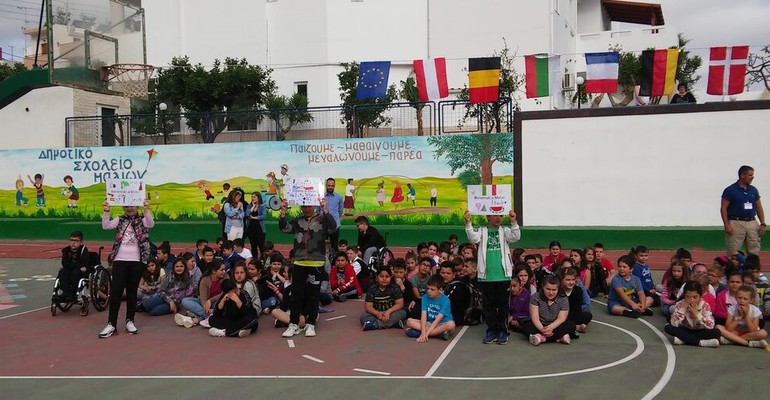
The 1st Primary School of Malia “Sarpidon” is located in the Heraklion Prefecture. Malia is a town on the north coast of the island of Crete, Greece with approximately 3,000 inhabitants. It is 35 km away from the airport city, Heraklion. It is a city with thousands of years of history, one of the most famous Minoan cities which has evolved into a modern, dynamic tourist destination.
The school shares its premises with the 2nd Primary School “Kernos”. The school complex is comprised of five buildings situated around a large playground with a basketball, a volleyball, a handball court and a play area. Apart from the classrooms housing mainstream classes, there are rooms and labs designated for teaching of other subjects such as ICT, Foreign Languages, Art and Music. There is a library, an assembly hall and a theatre room for school plays. Furthermore, after the morning curriculum when core subjects are taught, an optional midday schedule is developed for students to have lunch at school, study, do their homework and extracurricular activities.
In essence, the division between the two schools is only in administrative terms as there is no difference in the curriculum. Decision-making is a joint process involving the headteachers and all of the teaching staff of both schools. The personnel consists of roughly 35 teachers, that is 20 mainstream teachers of Greek Language, Maths, History, Geography, Environmental Studies, Science, Religious Education, 2 teachers of English, 2 teachers of French, 2 teachers of German, one Music teacher, one Drama teacher, one Art teacher, one ICT teacher and three Physical Education teachers. Moreover, one of the teachers provides extra assistance to immigrant children with added linguistic difficulties, whereas another one specializes in children with learning difficulties (ADHD, dyslexia etc) and acts as an assistant teacher during lessons. Currently, there is also support staff to cater for children with special needs.
All in all, there are approximately 350 students aged 6-12 years. Although the vast majority of the students are Greek, our school can boast of its multicultural identity. As Malia and the surrounding area is highly active in tourism and commerce, there are a lot of bilingual children from mixed marriages (Romanian, British, Dutch, Swedish, German, Hungarian, Ukrainian, Russian to name a few) as well as a large number of children of immigrant families, of mostly Balkan origin (Albanian, Bulgarian, Georgian).
The 1st Primary School of Malia has a long history of participating in educational innovations in the Greek system. It was among the 28 pilot primary schools all over the country from 1999 to 2003, in which a full-day curriculum was applied and theoretical principles were tested in practice. In the aftermath of this period, it remained one of the schools that followed a broader curriculum incorporating teaching English to very young learners and extensive instruction in ICT, for instance, until the educational reform in 2016, which established a single type of curriculum for all primary schools.
The school has participated in two Comenius, one entitled “Children’s literature as a means of multicultural education & combating xenophobia” & another under the title “Nutrition and Environment”, in both of which, visits, good practices & experiences were exchanged with schools & colleagues from Belgium, Cyprus, Czech Republic, England, Denmark, France, Germany, Italy, Slovakia and Sweden. Also, since 2015, our school is represented in the Teachers4Europe programme which serves to keep teachers updated matters related to the EU, ultimately aiming at helping students become active European citizens.
From 2014 to 2016, our school took part in the EU programme “Traffic snake Game” which fostered eco-friendly means of transportation, a campaign developed to encourage walking and cycling to school, with primary school children, parents & teachers being the main target group. Every year a variety of cross-curricular projects & carried out, related to environmental issues, health and nutrition, cultural topics etc which are accessible on the school webpage & are presented to the local community via school exhibitions open to the public, or widely disseminated though participation in festivals, conventions and conferences.
To increase the level of expertise and improve the quality of education offered to students, the school has also completed an Erasmus+KA1 scheme with a focus on innovative teaching methods and techniques along with the exploitation of multiculturalism towards interculturalism. We have also participated in an Erasmus+ KA201 project entitled "New Skills, New Schools - Common Standards and Skills in Education". For the next two years, we are implementing a new 229 project called "Cultural exchanges, your world, my world, our world".
Our experience in the EU programmes above described has brought us in contact with teachers from other countries and has developed our skills in intercultural communication. At the same time, it motivates us to further seek educational innovation & the evolution of our school as a thriving organization, leaving us with the desire to continue the invaluable cooperation with other schools and colleagues.
Furthermore, our school has considerable experience in organizing extra-curricular activities for students and parents alike. Having a number of reliable partners such as the Parents’ Association, the local Women’s Association and the regional Department of Social Policy, it has taken initiative in organizing a number of talks and seminars for parents delivered by scientists & experts on a variety of topics regarding children’s socio-emotional & cognitive development. Film viewings and theatrical plays also take place regularly & school sports games are conducted once a year.
For other information, please visit the school website at:
http://dim-malion.ira.sch.gr/